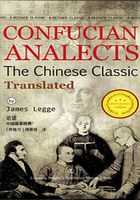
CHAPTER 7
1. Măng Woo asked about Tsze-loo, whether he was perfectly virtuous. The Master said, "I do not know."
2. He asked again, when the Master replied, "In a kingdom of a thousand chariots, Yew might be employed to manage the military levies, but I do not know whether he be perfectly virtuous."
3. "And what do you say of K'ew?" The Master replied, "In a city of a thousand families, or a house of a hundred chariots, K'ew might be employed as governor, but I do not know whether he is perfectly virtuous."
4. "What do you say of Ch'ih?" The Master replied, "With his sash girt and standing in a court, Ch'ih might be employed to converse with the visitors and guests, but I do not know whether he is perfectly virtuous."
7. OF TSZE-LOO, TSZE-YEW, AND TSZE-HWA. 1. 孟武伯, See II.6. 2. 千乘之国, see I.5. 赋, properly, 'revenues', 'taxes', but the quota of soldiers contributed being regul. by the amt. of the rev., the term is used here for the forces, or military levies. 3. 求 see III.6.百乘之家, in opp. to 千乘之国, was the secondary flef, the territory appropriated to the highest nobles or officers in a 国 or state, suppos. also to comprehend 1000 families. 为之宰, 'To be its governor.' This is a pec. idiom. 4. Ch'ih, surnamed 公西, and styled 子华, having now the 14th place, west, in the out. hall, was famous among the disciples for his knowl. of rules of cer., and those especially relating to dress and intercourse. 朝, low. 1st tone. 宾 and 客 may be distinguished, the former indicating nerghbouring princes visiting the court, the lat. ministers and officers of the state present as guests.
